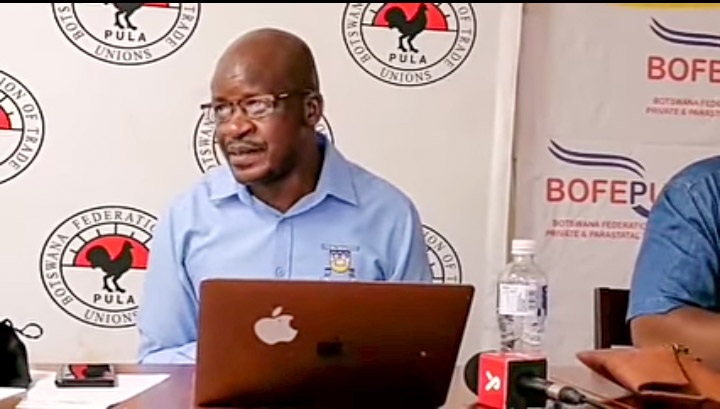In theory, it is common knowledge that slavery period has long passed a long time ago, and that it is prohibited by the laws of Botswana, but by the look of things, that is not really the case. The working class has been subjected to slavery, so says Tabokani Nicholas Rari, the Secretary General of Botswana Federation of Public, Private and Parastatal Sector Union (BOFEPUSU).
He said this yesterday during a joint press briefing by Botswana Federation of Trade Unions (BFTU) and Botswana Federation of Public, Private and Parastatal Sector Union (BOFEPUSU). Rari raised a concern over the companies that retrench workers though that is prohibited during the State of Public Emergency (SoPE). He also lamented that some companies don’t retrench workers but make sure they make worker’s lives a living hell.
According to Rari, they have as labour movement received reports from their members that their employers force them to take unpaid leaves. Some report that their salaries got cut by up to seventy or fifty percent (70/50%), while some are made to work for free. Rari says for these reasons, some of their members’ lives were forcibly rearranged altogether. It is said that some workers who their basic salaries amount to more than P10 000 end up getting around P3000.
“We know of the employees of the Trade Unions that are affiliated to us that have come to us and indicated to us that while they expect a salary of P10 000, the now they P3500. What does that mean? It means that those people had made commitments in their lives, and if they now get salaries of P3500 out of the expected P10 000, it then means that it drastically rearranges their way of life. Some employees in the Trade Unions that we represent also came to us and told us that their organizations are forcing them to take unpaid leaves. This is anti-labour, this is anti any labour laws that you can think of. Some employees came and said they worked and were not paid at all. This creates a lot of uncertainty within the working class. We both know that in the State of Public Emergency, one of the regulations that is there is that companies should not retrench. Some do retrench contrary to that, some don’t retrench but they cut the salaries by 50/70%. We see now slaves, where people go to work, then the employer says ‘we don’t get any profits, but we cannot release you to go look for alternative employment because we can’t retrench’. So we see people who work but they don’t get paid, this has taken us back to the years of slavery.” Rari charged.
Rari says they as labour movements are forseeing mass retrenchments after the State of Public Emergency which is set to come to an end in a month’s time. A move that will further escalate the unemployment rate, of which the movements think the government is not prepared to help in any way. Rari says post lockdown, the government did not have a clear plan on how to revitalize the economy. He said this giving an example of industries like entertainment, alcohol and tourism which has not been functioning.
The movements are further worried of the government’s inability to provide Personal Protective Equipment (PPE) to frontline workers like teachers who are exposed to the virus. Rari, who is also the Secretary General of Botswana Sectors of Educators Trade Union (BOSETU) says that in the past two (2) months, twenty-four (24) teachers lost their lives due to COVID-19 related complications. Despite these Rari says the government is not even considering giving the frontline workers risk allowance as it is the case in some African countries.










